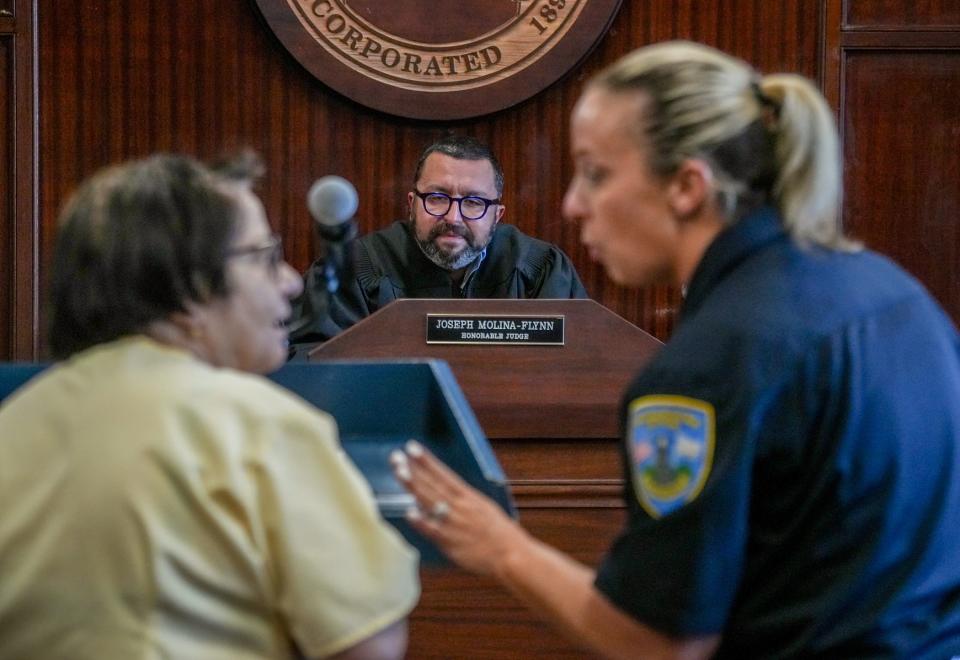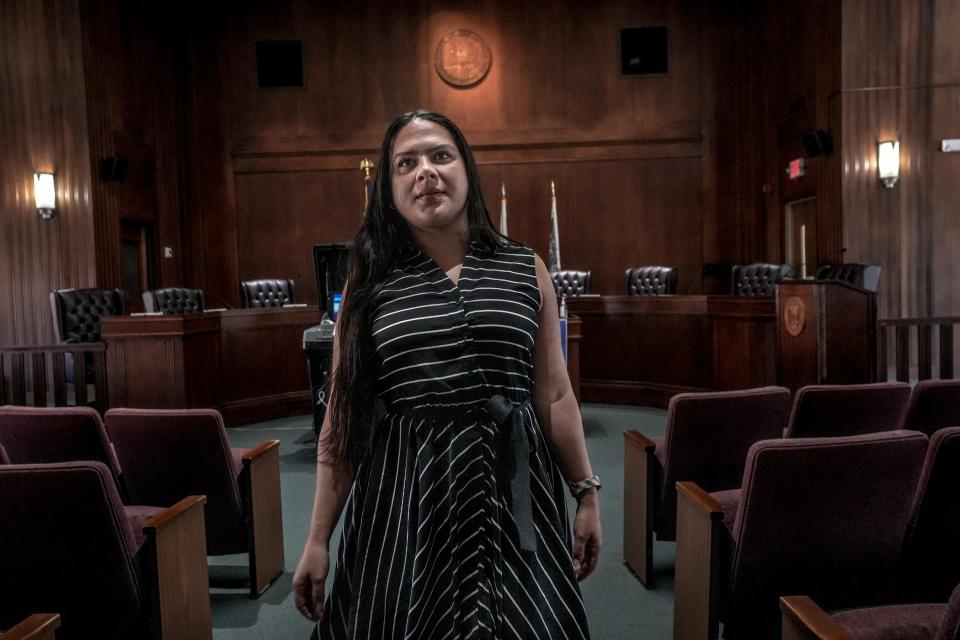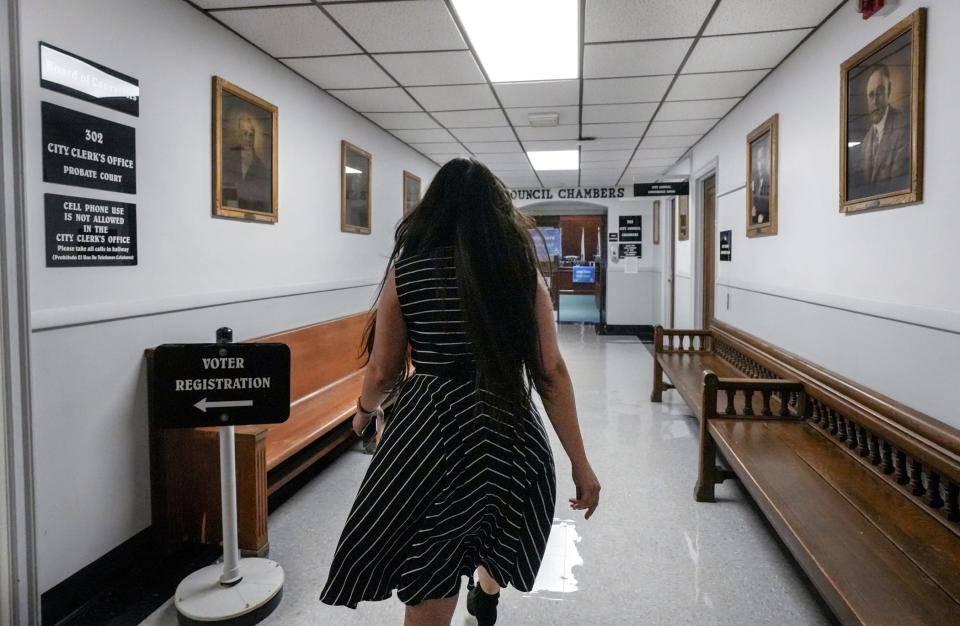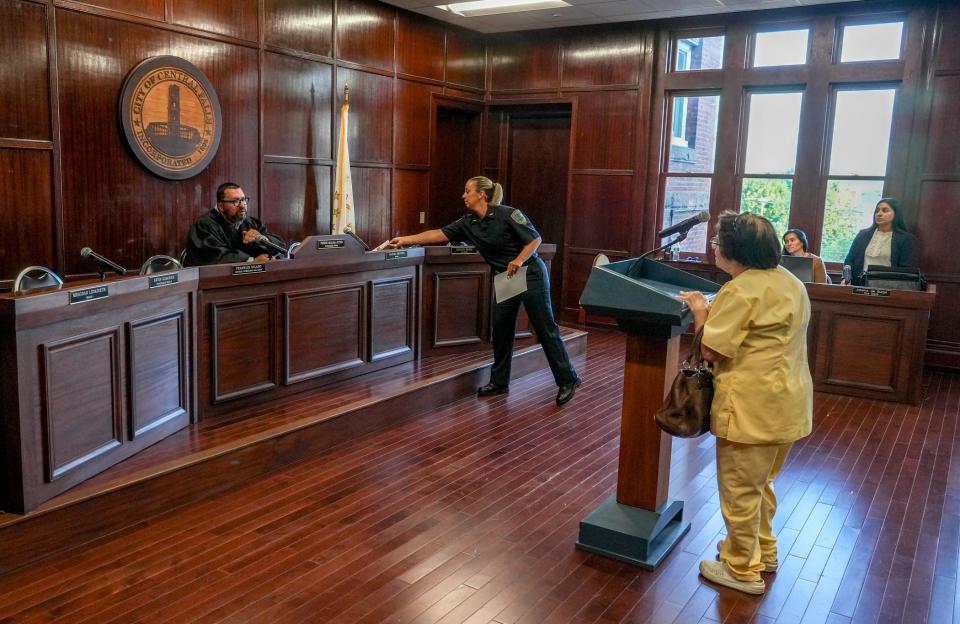Kids as translators? Non-English speakers lack trained interpreters in RI's local courts
When Andrew Horwitz started practicing in Rhode Island District Court in 1995, language interpretation in the state courts was haphazard.
“It was sometimes complete strangers in the audience,” Horwitz, now a law professor at Roger Williams University, said. “Sometimes the judge or a sheriff would say, ‘Hey, anybody here speak Spanish? Anybody here speak Portuguese?’ And they’d just call this random person up who may also be a defendant facing a criminal charge.”
Court staffers were regularly pulled from their jobs to translate hearings, a task they had not been trained to do, he recalled. Judges also allowed people with limited English proficiency to interpret for those who had none. Often, those people had a stake in the case, making them unreliable. And they didn’t understand that court interpreting didn’t mean having a conversation with the defendant, then paraphrasing it for the judge. That made the court record unclear.
The situation was “embarrassing, disgraceful, [and] clearly unconstitutional,” Horwitz said.

Over the years, interpretation in the District, Family and Superior courts has improved. Those courts now have seven full-time Spanish-language interpreters and hire freelancers for other languages. They also have an additional part-time Spanish interpreter, courts spokesperson Lexi Kriss said in an email. In 2021, state court interpreters assisted with 7,750 events in 31 languages, according to the judiciary’s annual report. More than 7,000 were for Spanish.
But in the local municipal and probate courts, people still frequently bring their own interpreters, who are not always fluent in English themselves, or rely on a city employee who may be bilingual but not professionally trained. At least one court sometimes resorts to Google Translate. Another has used a police prosecutor to interpret for the people she’s supposed to be prosecuting.
Judicial experts see problems with this status quo and suggest it may violate federal law or even be unconstitutional. Being a court interpreter requires much more than knowing two languages. A court interpreter needs to be able to translate quickly, with no additions or substitutions. And when people don’t receive professional interpretation and can’t understand the proceedings in which they are involved, it can negatively impact the way they perceive the legal process and muddy the official court record, experts say.
Should a prosecutor interpret for a defendant? Critics see 'huge conflict of interest'
Wearing a brown knit hat, pink sneakers and colorful sweatshirt emblazoned with a desert scene, Merita Rosario appeared before Judge Daniel McKiernan in Providence Municipal Court on March 16. She had come to resolve three red-light tickets and needed a Spanish interpreter, so McKiernan told her, “We’re going to get a translator, but she’s going to step in.”
The woman he was referring to was not a court interpreter, but Cynthia Rodriguez, the police prosecutor covering his courtroom.
The judge began playing the videos of Rosario’s car. “I forgot what he said,” Rodriguez said of McKiernan at one point, as she translated the date of one of the videos. Experts say interpreters are supposed to act as a conduit and not interject, but at another point, Rosario asked a question and Rodriguez answered it in Spanish before translating the exchange into English.
More: 'Dark cloud' over District Court: Ex admin alleges coverups, dysfunction and retaliation
McKiernan forgave one of Rosario’s tickets and gave her 30 days to pay $170 for the other two.
Then, Rodriguez interpreted for another person who only spoke Spanish fluently.
Asked afterward if she is professionally trained as an interpreter or bilingual, Rodriguez said she was bilingual and walked out of the courtroom.
Experts interviewed for this story were critical of McKiernan’s decision to have a prosecutor interpret.
“That’s a huge conflict of interest,” said Nicole Gonzalez Van Cleve, a Brown professor who studies racial inequities in the legal system.
Steven Brown, director of the American Civil Liberties Union of Rhode Island, said, “That is completely inappropriate.
“It should be obvious that a person who is prosecuting a charge should not be tasked with the responsibility of interpreting for the defendant that they are prosecuting. The conflict is blatant and that should never happen.”
Why having an untrained interpreter is sometimes 'worse than nothing'
A court interpreter has a complicated job that demands a high skill level. They must be able to navigate legalese and vocabulary ranging from street slang to sophisticated language from an expert witness, lawyer or judge. They are required to interpret at a person’s language level, so a court “should be hearing exactly what that person is saying and how they’re saying it,” without additions or omissions, said Brooke Bogue, the manager of the Language Access Services Section at the National Center for State Courts.
Court interpreters are often certified. For Rhode Island state courts, that means they have undergone training and passed written and oral examinations.
But as McKiernan did in Rosario's case, many local courts in Rhode Island appear to still use people who are bilingual — but not professionally trained — as court interpreters, according to local attorneys and judges, as well as a reporter's observation of hearings in multiple cities.
Language skills alone are not a substitute for professional training, according to Bogue.
“A bilingual person cannot interpret. … There should be no assumption they have any interpreting skills whatsoever,” she said.
Using a bilingual person instead of a professional interpreter is “worse than nothing,” Bogue argued, because English speakers involved in a proceeding will assume the communication was error-free when it likely wasn’t.
“Their job is to linguistically place the limited English-proficient court user in the exact same position as an English speaker,” she said. “And if they don’t do that, then basically that person’s access to justice is denied or hindered or could be delayed.”
But the cost of hiring professional interpreters may pose an obstacle to local courts.

At Woonsocket Municipal Court hearings, people usually have to bring someone to interpret on their own, said a clerk who declined to identify herself when a reporter called the court. The city doesn’t have funds to hire people, she said. If someone doesn’t have an interpreter, the city uses Google Translate instead, she said.
In Pawtucket, Sandra Perez, who works in the mayor’s office, helps out as an interpreter for the city’s municipal court. She doesn't have a professional credential, but she was born in Colombia and interpreted in state court when she worked as a paralegal before she got her current job. “I think overall, I can usually get across the point,” she said.
During a recent municipal court session before Judge Jack Gannon, Perez interpreted for one case. Another man needed an interpreter, too, but he had brought his daughter, and Gannon allowed her to translate. Early on, Gannon began discussing the case with the man’s daughter instead of with him, and she stopped translating everything.
More: She wanted a comfortable retirement and made all the right plans. How did it go so wrong?
Gannon dismissed the man’s speeding violation because he was eligible under Rhode Island’s good driving statute and ordered him to pay $60 in court costs.
In a short interview, Gannon said he’s concerned about whether the person who needs an interpreter comprehends everything in these cases. Asked if he thinks everything gets translated when a family member interprets, he said, “Minimally, I worry about it, but it doesn’t really enter into my thought process when I make a decision.” He uses eye contact to try to figure out if the person who needs an interpreter understands and thinks a family member would be aligned with the case party, he said.
Gonzalez Van Cleve, the Brown professor, said cases where relatives act as interpreters are problematic, because “they themselves as a lay person don’t understand the court proceedings.”

Higher stakes in probate cases involving immigration
In Rhode Island probate courts, the situation is largely the same.
Providence attorney Amber Lewis, who handles minor guardianship cases for children pursuing special immigrant juvenile status, said most probate courts require her to bring someone to interpret.
In cases where a judge takes testimony and speaks with her clients, “sometimes that lack of certified interpretation causes the clients issues,” she said. “Their family or friends [who are interpreting] aren’t completely fluent in English and so don’t know how to translate correctly.”
The improvised interpreters struggle with legal vocabulary, and that can create delays. It may also be unclear whose words are actually being translated, Lewis said.
The stakes are higher in these hearings than in many municipal court cases, because minor guardianship is a step in a process that can lead to these children getting a green card.
Janne Reisch, a Westerly-based solo practitioner who also represents immigrant children in minor guardianships, thinks every town court should provide interpreters to those who need them. The current situation “impinges on my client’s right to have equal access to the judiciary,” she said.
The smaller probate courts tell her to bring her own interpreter. She doesn’t think she has a legal obligation to do so but doesn’t want to upset clerks and judges, so she hires a bilingual person to interpret, usually a paralegal from another law office. That places a burden on her clients, who are almost exclusively low income, because they have to foot the bill. “I don’t think that’s fair,” she said.
Last year, one probate court, which she declined to name, insisted she bring a professionally certified interpreter instead of someone who was just bilingual. After she provided legal and constitutional analysis, the court agreed to hire a certified interpreter and pay for that expense.
Using children as interpreters, and other workarounds
Some local courts have found ways to provide court users with professional interpreters but still don’t use them universally.
Central Falls Municipal Court Judge Joseph Molina Flynn said that when someone doesn’t speak English and hasn’t brought anyone to translate, he may continue the case and ask them to bring someone with them next time. He and his clerk speak Spanish and can pick up on interpretation errors. If someone can’t find a person to interpret or if they have a trial, the city hires professional interpreters from the state courts. Molina Flynn's court sessions occur in the evening, when those interpreters are available.
That’s something he advocated for when he became the judge two years ago. “The community here is pretty much solely Spanish-speaking, and as an immigrant myself, I can understand the difficulties of dealing with complex things in a language that is not your own,” he said.

Hispanic Bar Association interim president Diony Garcia – who was a Providence Housing Court judge until April – said the housing court uses a phone service, Language Line Solutions, that provides professional judicial interpreters.
If Garcia weren’t a Spanish speaker, he thinks a lot might have gotten lost in translation. That’s why it’s important to have diverse judges, he said. He could tell when someone said, “I understand,” but really didn’t, for instance.
People would come to his court with their adult or high school-age child, making them miss school or work. For minor matters or setting a new date, he would sometimes allow a family member to interpret, but he was wary. It’s an unfair position for young people to be in, he said. Some relatives would supply extra information in an effort to be helpful or try to act as a speaker for the actual case party. “You don’t want somebody effectively practicing law illegally in front of me,” he said.
He was cautious, because he worries that if a person doesn’t understand what’s happening in court, they’re being denied due process.
For a formal hearing or trial, Judge Paul Ragosta of the Housing Court insists on a professional interpreter. But in one case, before he learned about the phone service, he allowed a boy who was around 10 to 14 years old to interpret for his mother, who was a tenant and not an actual case party, during a substantive hearing involving their landlord.
Providence Housing Court appeals, unlike those of most other local courts, go directly to the state Supreme Court. That means the right to appeal is not automatic. And unlike many municipal court appeals, the case won’t be heard again from the beginning. Rather, the Supreme Court would only consider legal errors.
It’s important for the housing court record to be accurate, and Ragosta said it’s “dubious” that a record with interpretation by a 10-year-old child would be.
Does the current situation violate federal law?
Horwitz says it’s unconstitutional not to provide court participants with a trained and professionally certified interpreter.
Even in minor cases, he said, “If you can’t understand the proceedings, or you don’t understand the proceedings perfectly, then the proceeding becomes a sham, and the public perception of the fairness of the system is seriously impaired.” It can damage the way a non-English speaker views the legal process in which they’re involved.

Under Title VI of the 1964 Civil Rights Act, no one can be discriminated against because of their race or national origin by a program that receives federal funds, as do many of the municipalities that run these courts. That often means those with limited English proficiency must receive language interpretation or translation services.
ACLU director Brown said, “Somebody who doesn’t have any official certification or no formal qualifications generally does not meet the standard that the Title VI regulations require.”
Rhode Island does not require cities and towns to have municipal courts. If they decide to operate one, Horwitz said, they must fund it appropriately, and that should include paying for professional interpretation.
“They’re raising money for the municipality, and to do it on the cheap, with disregard for the rights of the people who are litigating in those courts, I think it’s inexcusable,” he said.
Noble Brigham is a senior journalism student at Brown University. He wrote this story under the guidance of retired Journal reporter and Brown professor Tracy Breton. Email him at noble_brigham@brown.edu
This article originally appeared on The Providence Journal: Language barrier in RI local courts: Trained interpreters are lacking

